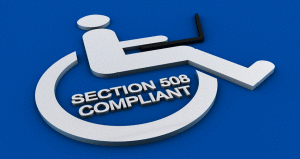H2K is committed to providing access to our website for all visitors with disabilities. The Rehabilitation Act of 1973, as amended (29 U.S.C. 794d) prohibits discrimination on the basis of disability in programs conducted by Federal agencies, in programs receiving Federal financial assistance, in Federal employment, and in the employment practices of Federal contractors. The standards for determining employment discrimination under the Rehabilitation Act are the same as those used in title I of the Americans with Disabilities Act (ADA). On July 26th, 1990, President George H. W. Bush signed into law the ADA. On August 7th, 1998, President Bill Clinton signed into law the Rehabilitation Act Amendments of 1998. These amendments significantly expanded and strengthened the technology access requirements in Section 508 of the Rehabilitation Act. On April 18th, 2001 the Federal Acquisition Regulation (FAR) was revised to implement Section 508 as required by law. Today, the FAR requires all Electronic and Information Technology (EIT) developed, procured, maintained, or used by the Federal Government (effective June 25th, 2001) be accessible to people with disabilities. The definition of EIT and the accessibility standards were developed by the Access Board. These standards, requirement exceptions, the FAR rule, and a wealth of other information regarding the Federal IT Accessibility Initiative can be found at www.section508.gov. The accessibility standards also can be found at 36 CFR Part 1194. To meet our commitment, we comply with the requirements of Section 508 of the Rehabilitation Act. Section 508 (29 U.S.C. 794d), requiring that individuals with disabilities, who are federal employees or members of the public seeking information or
services from us have access to and use of information and data that is comparable to the information provided to federal employees or the public who are not individuals with disabilities, unless an undue burden would be imposed on us. If you have a problem viewing any material on H2Kinc.com because of difficulties with assistive technologies, please contact H2K at (410) 799-1032 for assistance. If you have any other questions or problems about a page on H2Kinc.com, please send your concerns to Info@H2Kinc.com. If you contact us by email, please help us respond to you in the most helpful way by indicating the nature of your accessibility problem, the preferred format in which you want to receive the material, and your contact information. H2K provides agencies with all information available regarding compliance with accessibility standards, partial compliance, or what accessibility features are offered on products and services provided by H2K. When products from external suppliers/manufacturers are used in conjunction with ones H2K produces, we will refer inquiries to the appropriate supplier/manufacturer for the most current Section 508 information. Accessibility Aids: Plug-ins and File Viewers All applets, plug-ins, or other applications required by H2K webpages that are not included on the specific page are found as links from this page. Most of these links are to non-government sources. H2K does not endorse any of these products; they are listed below for the convenience of our visitors. Address questions about the particular plug-in or file viewer to the respective vendor. Adobe Acrobat Use Adobe Acrobat to read Portable Document Format (PDF) files.
Adobe Flash Player Files with this extension (SWF) require the Adobe Flash Player. Microsoft Word Microsoft offers file viewer and converter programs to enable those who do not have MS-Word or have another version of MS-Word to open and view MS-Word files. Microsoft Excel Microsoft offers file viewer and converter programs to enable those who do not have MS-Excel or have another version of MS-Excel to view MS-Excel files. Microsoft PowerPoint Microsoft offers file viewer and converter programs to enable those who do not have MS-PowerPoint or have another version of MS-PowerPoint to view MS-PowerPoint files. WinZip Zip files are single files, sometimes called “archives”, that contain one or more compressed files. Files with this extension (.zip) require the WinZip, to open and extract them.

